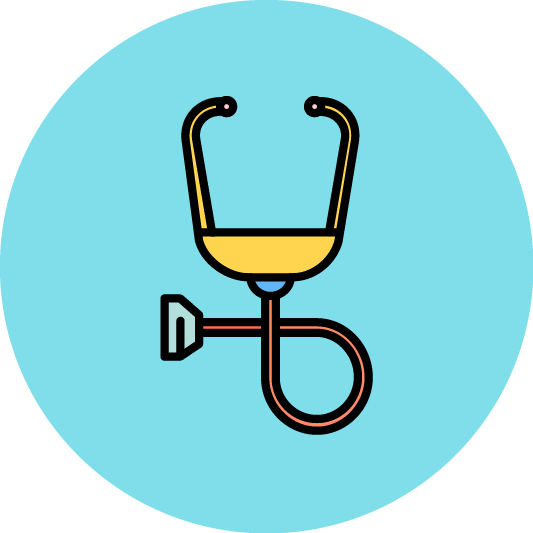Internal Medicine Application Overview
The application for Internal Medical Training is a national process (applications to Northern Ireland are separate) with details appearing online via the specialty recruitment website and Oriel in November/December.
Below is the timeframe for 2023 selection.
Round 1
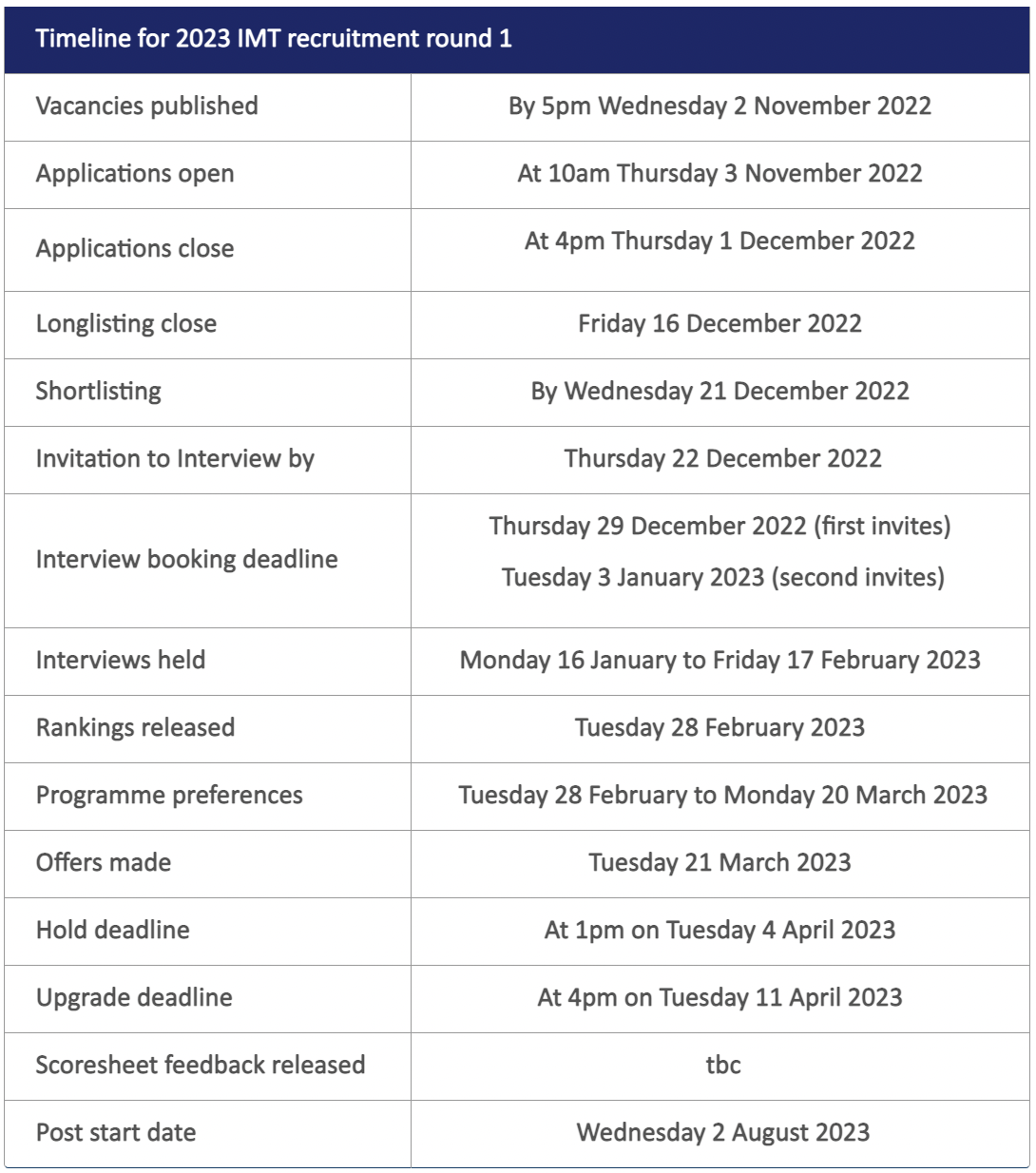
December
The application focuses on the essential criteria for Internal Medicine IMT1 as outlined in the Person Specification.
It is important to be aware of the specific wording of the eligibility requirements and make sure you have attained the required competencies by the set deadlines.
Together with your personal and job details the most important part of the application is the Evidence section on which you will be scored.
18th Feb
Application Evidence Section
IMT Applications are scored automatically and, at the shortlisting stage, scores are based entirely on each candidate's self-assessment of their achievements using the options selected from each of the domains.
Section 7: Evidence
The evidence page of the application form includes seven areas on which all applications will be scored, on the basis of qualifications, achievements, experience, etc.
In each case, you will be required to select an option from a drop-down menu next to the heading of each topic area. Within the drop-down menu, the higher options represent those which will contribute greater scores to your application form assessment; ie the higher the better. Below you will find the options and their scoring.
All achievements added to your application will be checked by clinicians at interview and in the instance of multiple achievements for each area the highest scoring achievement should be used.
Postgraduate Degrees and Qualifications
Responses and Scores:
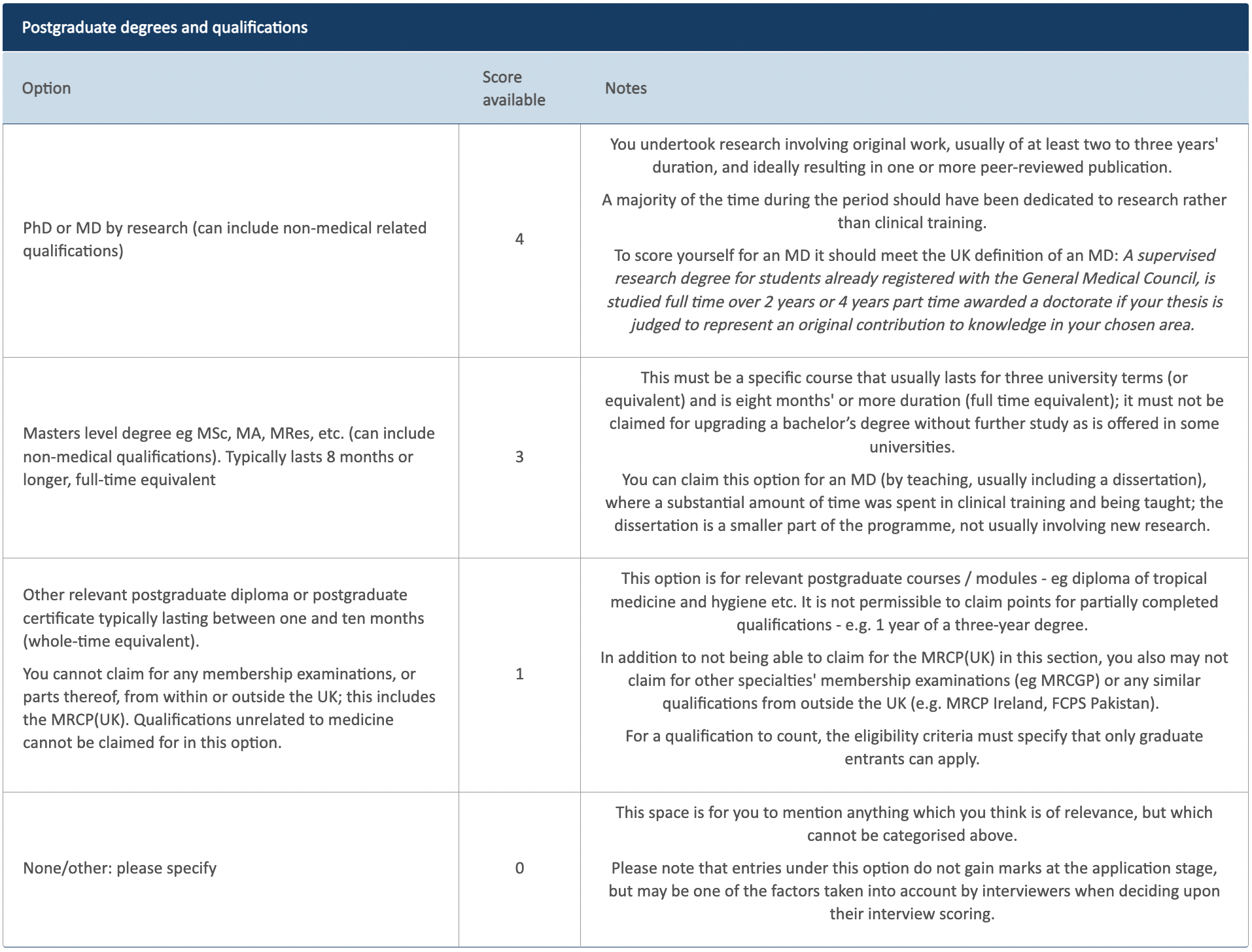
Degree classifications
Where you have gained a degree/qualification which does not appear to fit exactly within one of the options available here, please select the option here which you deem equivalent based upon your knowledge of the level of the qualifications within the UK and the country where you gained your qualification.
You will be required to justify your selected option on the application form as to why you deemed this the equivalent option; interviewers may ask you about this further at interview.
Intercalated degrees
Intercalated degrees cannot be scored in any section of self-assessment. These are usually awarded at bachelors’ level but are sometimes given at masters level. Regardless of which level your degree was awarded at, you cannot claim for intercalated degrees in this, or any other, section.
Teaching postgraduate qualifications not to be included
Please note that any postgraduate qualifications related to teaching that you may have gained (eg. PG Cert, PG Dip etc) should not be scored for in this section, and should instead be included in the Training in Teaching section.
MRCP(UK) not included
Please do not include details of MRCP(UK) (or other postgraduate examinations of this nature) within this section.
Examples of evidence
Where possible you should be able to show your qualification certificate. Where you do not have access to it, a letter from the awarding body confirming the qualification will suffice.
Additional Achievements
Responses and Scores:
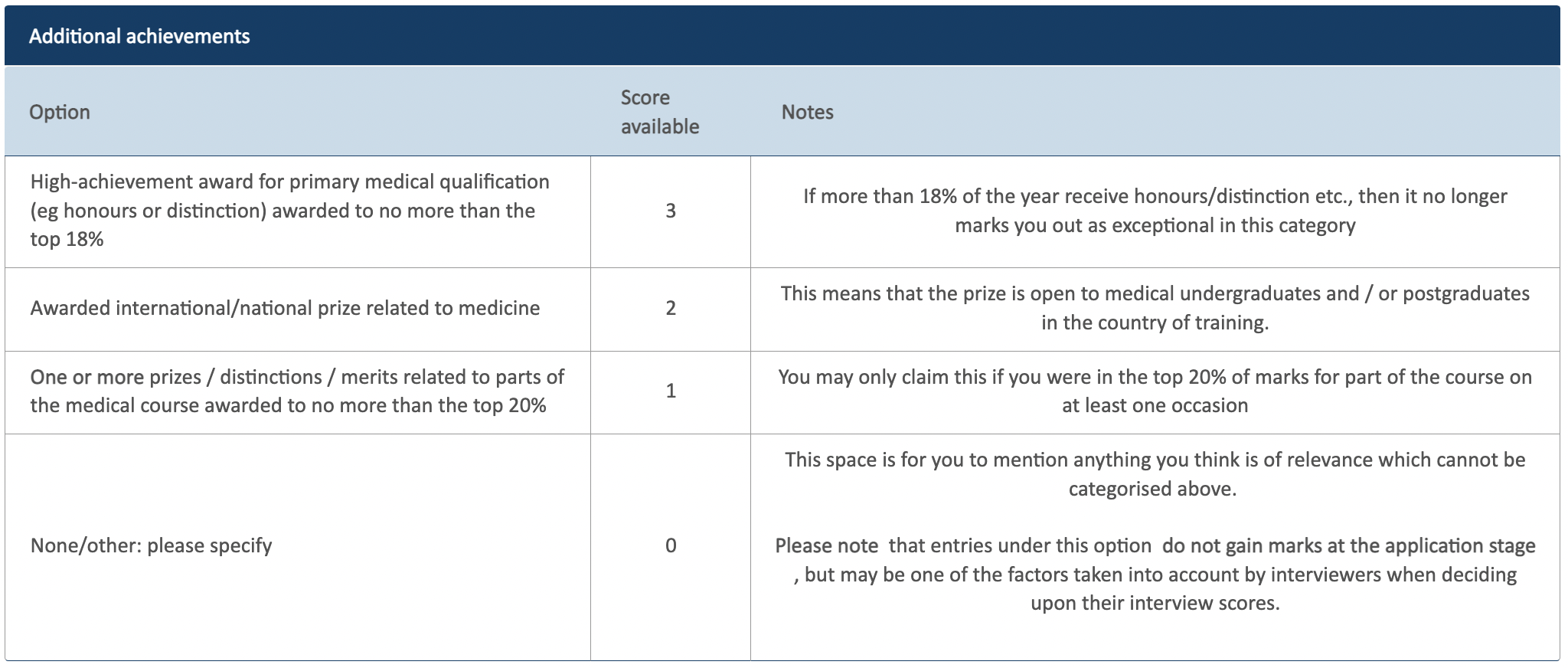
Examples of evidence
This would normally be a letter or certificate from the medical school or organiser which confirms the award.
Presentations and Posters
These can be of anything related to medicine, typically a case or case series, research or other topic.
Please note - you must not include any presentations relating to audit or quality improvement projects here - use the specific 'quality improvement and clinical audit' section
Responses and Scores:
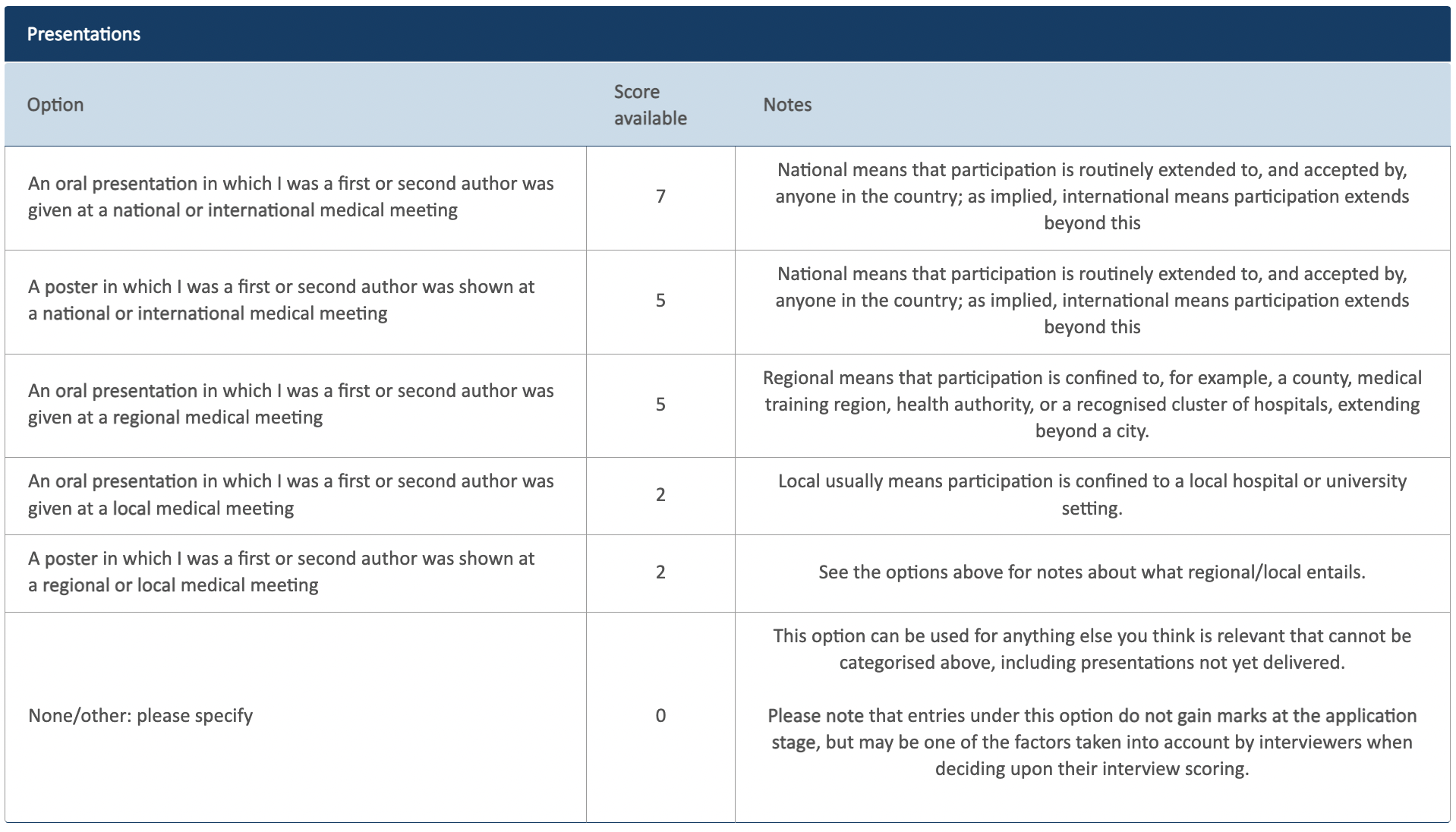
What is a presentation?
'Presentations' referred to here are oral presentations, with or without slides, in front of an audience of healthcare professionals.
These can be of anything related to medicine, typically a case or case series, research or other topic. It would normally be expected to include a question and answer session.
Posters
If a poster is shown without an accompanying oral presentation you can still claim points in line with the relevant statement below.
'Shown' should be considered to mean a significant role in the content of the poster with a defined opportunity for discussion during the conference/meeting at which it is displayed.
What if I did not personally present or show a poster?
If you were a significant contributor (usually first or second author) to a presentation/poster but did not personally present/show it, you can still claim the points as if you had presented.
Presentations/posters cancelled due to COVID-19
If you were due to present a poster or oral presentation which was cancelled due to the COVID-19 outbreak, you may claim the points as if it had been presented. You will need to be able to access evidence that your work was selected for presentation, the event was cancelled due to COVID-19 and the work completed; e.g. poster, abstract, PowerPoint presentation etc.
What is a medical meeting?
Typically, this will be an audience of doctors and/or other healthcare professionals attending away from their normal place of work for which attendees will be undertaking continuing professional development.
The exception to this is the option for a local meeting where the audience is predominantly internal to that workplace.
Examples of evidence
This could include a range of documents, examples include: a certificate or letter confirming the invitation and/or delivery of the presentation/poster, an abstract submitted to the organiser, inclusion in the abstracts book for the meeting, a copy of the presentation slides or poster.
Publications
Where possible, you should include this PubMed reference when giving details of publications. Cochrane reviews can be regarded as equivalent.
Responses and Scores:
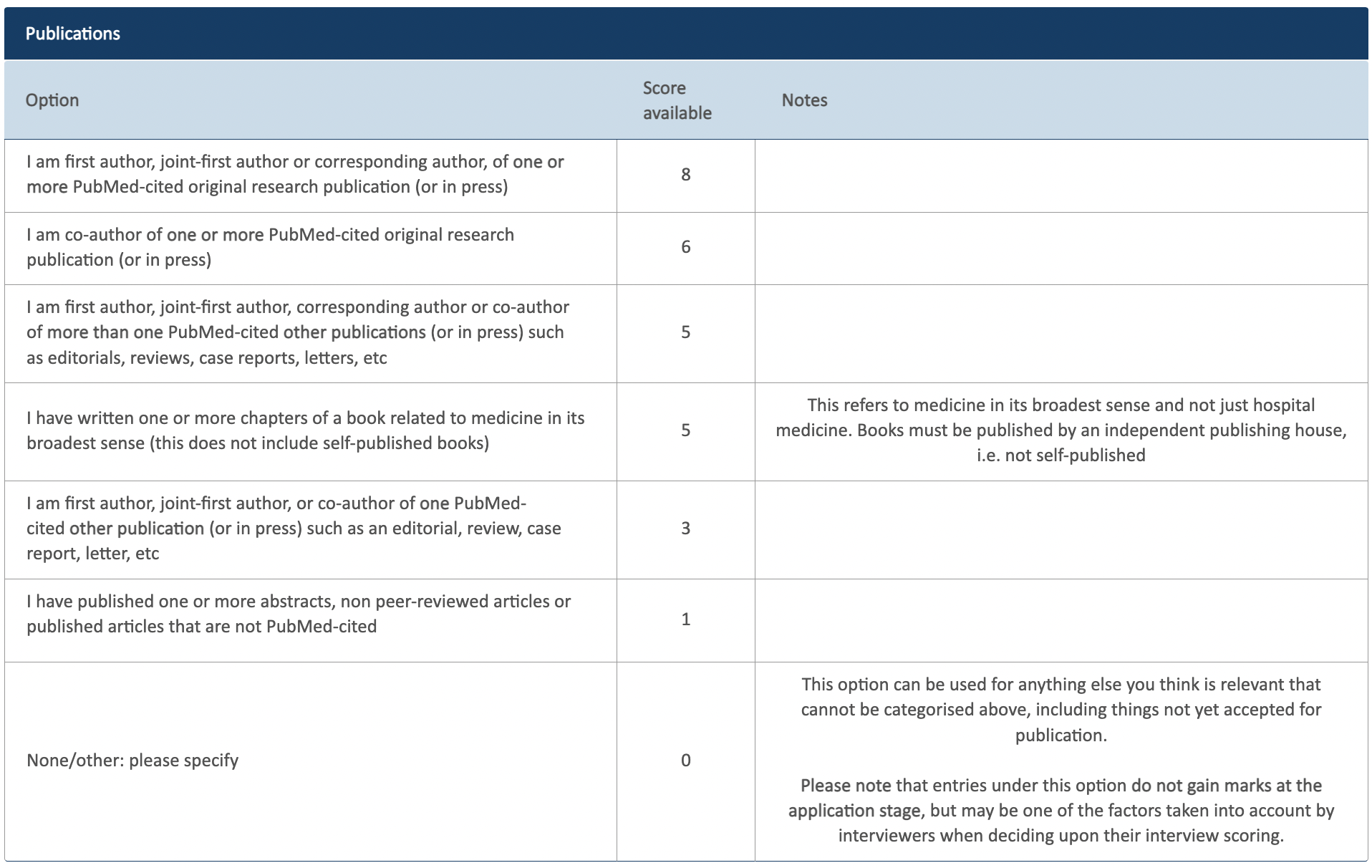
Any item included under an option stating 'PubMed-cited' must be cited in PubMed, so as to demonstrate that it is both peer-reviewed and relevant to medicine.
Where possible, you should include the PubMed reference when giving details of publications and the application form will require you to leave the web link for your article; Cochrane reviews can be regarded as equivalent.
The only exception to this is in the case of published medical books, which do not require PubMed citation.
Authorship
Any stated authorship must be recognised by PubMed within the author section of the citation system.
In press
Whilst achievements not yet gained cannot usually be claimed, an exception to this are any articles/publications which have been completely accepted, but are just waiting to be published - i.e. 'in press'.
Examples of evidence
A photocopy of the article/webpage where the article is found, excerpts from a medical book, confirmation that your article is ‘in press’ if not yet published. The PubMed link should be included on the application form where it is available.
Teaching Experience
Responses and Scores:
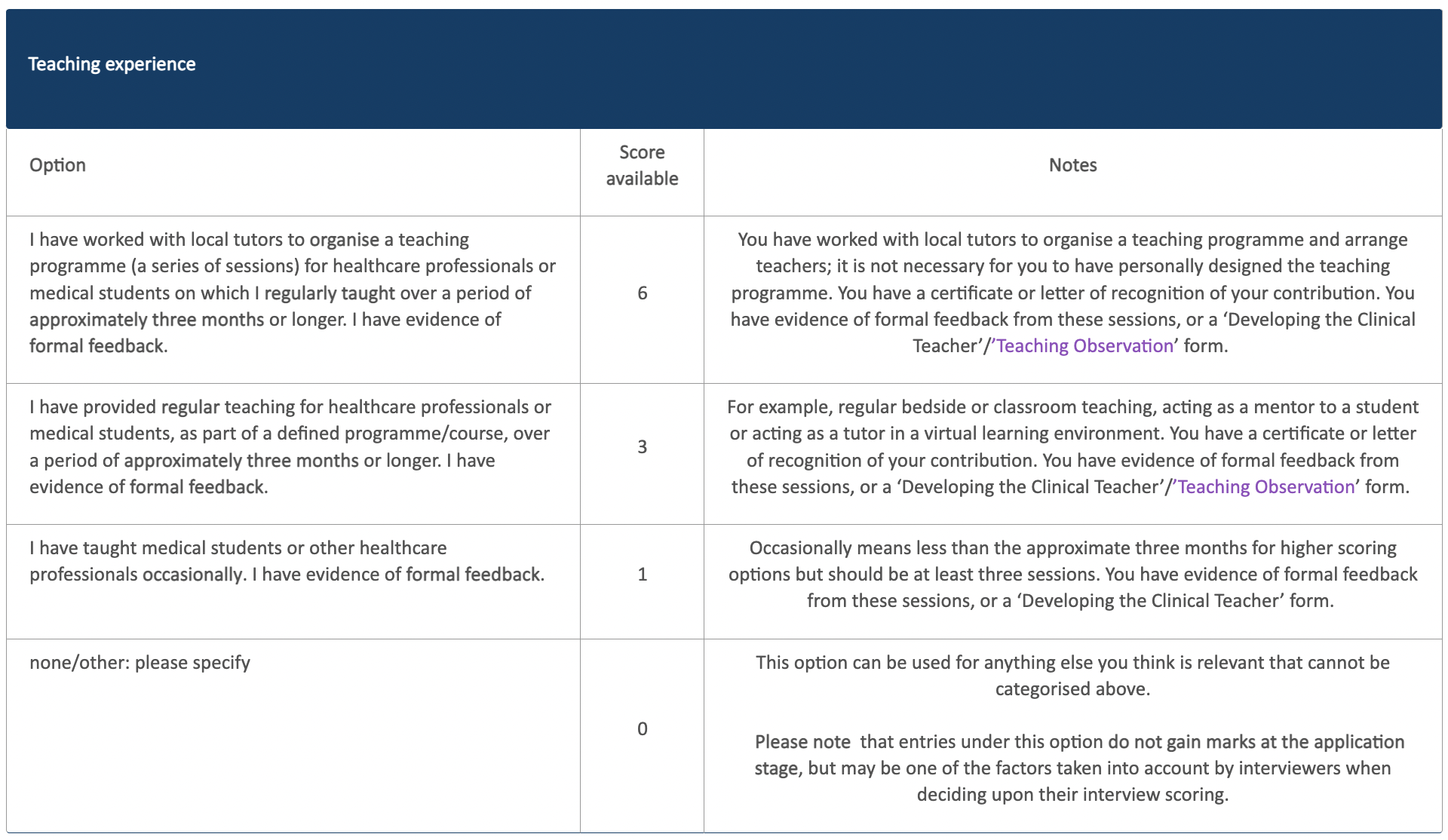
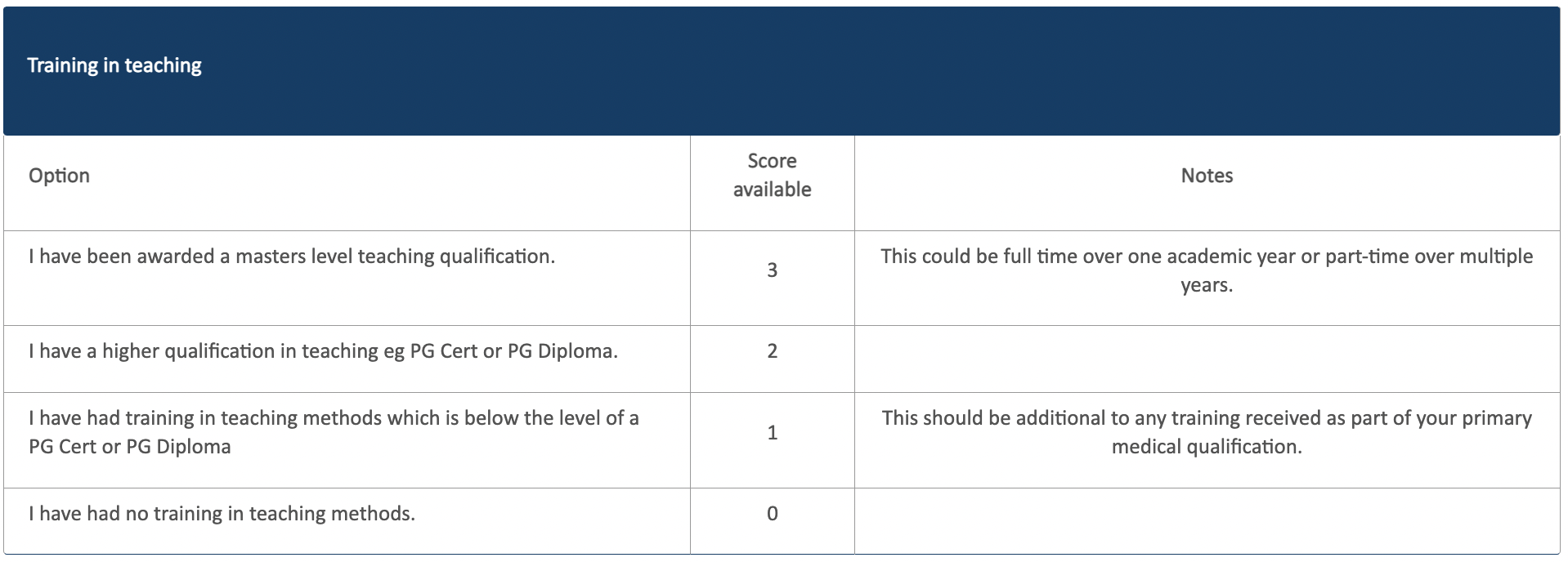
It is difficult to be prescriptive about timescales as it will depend on the regularity and length of sessions. What is important is that a lasting commitment to a meaningful teaching programme can be demonstrated. Therefore, you will need to use your professional judgement if your programme was less than three months on whether you can reasonably select this option and provide evidence accordingly.
Feedback
This means you have either evidence of senior observation and feedback (e.g. Developing the Clinical Teacher or Teaching Observation form) or that there has been collection and analysis of participants' feedback forms with independent verification. Independent feedback should ideally be supported by a letter or certificate from a course organiser/deputy, local tutors or a report detailing the analysis.
COVID-19
It is recognised that some teaching programmes may have been disrupted due to the COVID-19 outbreak. Any teaching programme that had been fully organised with at least some sessions delivered, may claim the option as if the programme had been completed. You must provide a letter from your local tutor/organisation to confirm the situation and you must also have evidence of your work up to the point of cancellation; e.g. timetable, outline programme, any presentation materials, feedback on the sessions delivered.
Examples of evidence
Teaching experience
Evidence of formal feedback collected is required for all scoring options – this could be a letter/form from the local tutor/organisation or feedback forms from attendees.
To score the two highest scoring options you will additionally need to provide:
a letter from your local tutor/organisation confirming your contribution to the course
evidence of the timetable, outline of the programme/content
Letters from a tutor/organisation responsible for your programme must be on a headed document from the organisation.
Training in teaching
Where possible you should be able to show your qualification certificate. Where you do not have access to it, a letter from the awarding body confirming attendance on the course or completion of the qualification will suffice.
Quality Improvement
Responses and Scores:
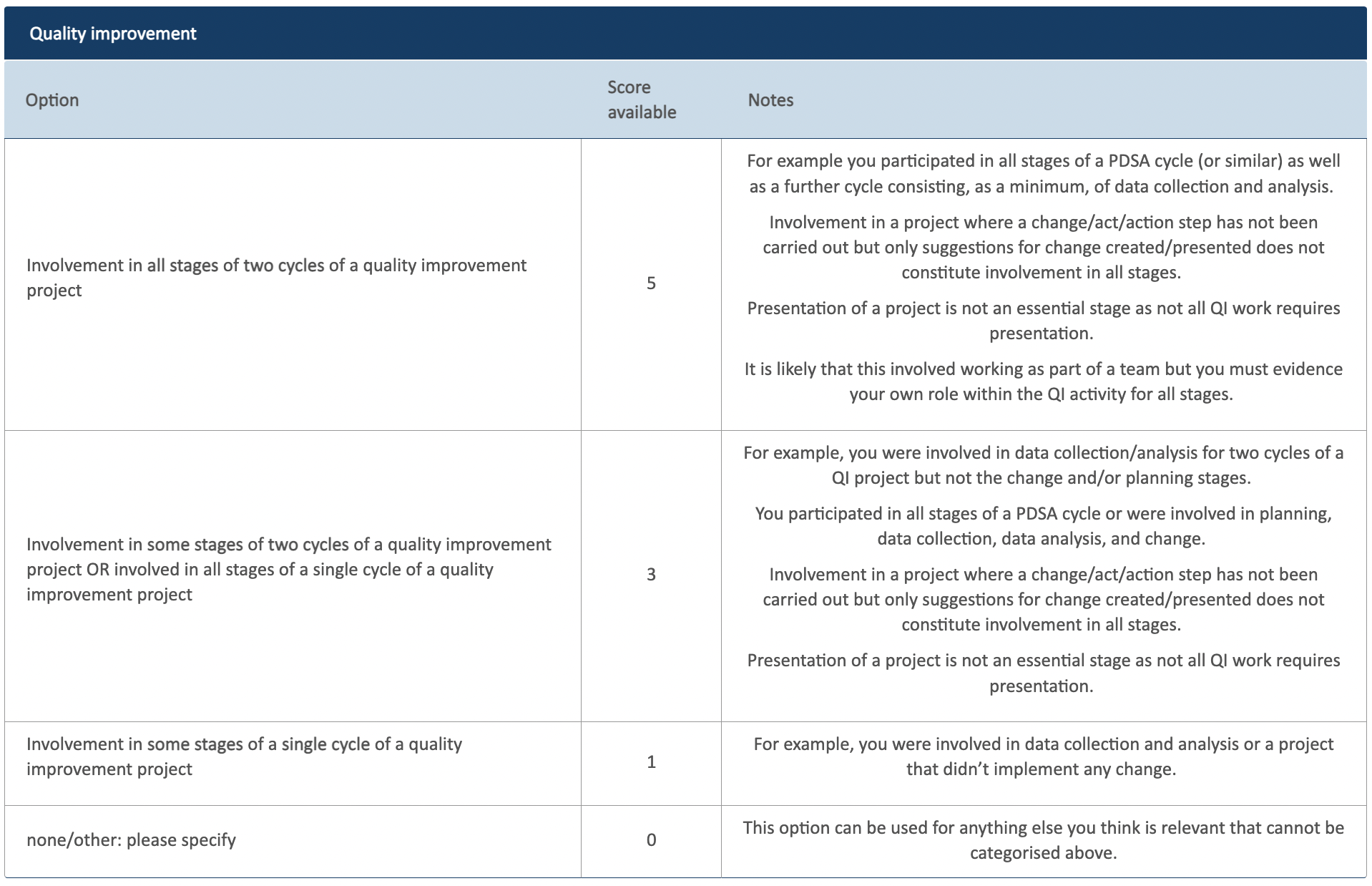
Please note:
If you have been involved in a long-running multi-cycle project, you can only claim points based on the cycles in which you were directly involved.
If your project has not yet completed a single cycle, you can only select the 'none/other' option.
COVID-19
It is recognised that some quality improvement projects may have been disrupted due to the COVID-19 outbreak. Any project which had been fully designed and data collection commenced but could not be completed due to the COVID-19 outbreak, may claim the option as if that cycle of the planned project had been delivered. You must provide correspondence from your supervisor/or other appropriate consultant to confirm the situation and you must also have evidence of your work up to the point of cancellation; e.g. project outline, data capture.
Examples of evidence
The preference is a QIPAT form. If this is not available, a headed document from your supervisor/organisation confirming similar information, which must as a minimum cover:
- QIP topic (The reason for the choice of QIP is clear, aims of the QIP are stated, SMART and trainee led)
- QI measures identified (Process, outcome and balancing measures identified)
- Demonstration of use of QIP methodology
- Change implementation (Documentation of progress, problems and unexpected observations. Run chart of results)
- Evaluation of change (Complete analysis of data. Data compared to predictions. Clear identification of what was learnt)
- Future application of the QIP considered
- A fully completed QIPAT form or equivalent document will mean no additional evidence is required. If you feel you need to attach additional information to demonstrate your project, this could include: project outline/plan, the project presentation/poster; all evidence should describe your direct involvement.
Leadership & Management
Examples of roles in healthcare include: BMA national executive, trainee representative of a specialist society or college or a nationally held leadership and management fellowship.
Examples of roles in a non-medical voluntary capacity include: charity, scouting/guides, sports, creative arts, police/military.
Responses and Scores:
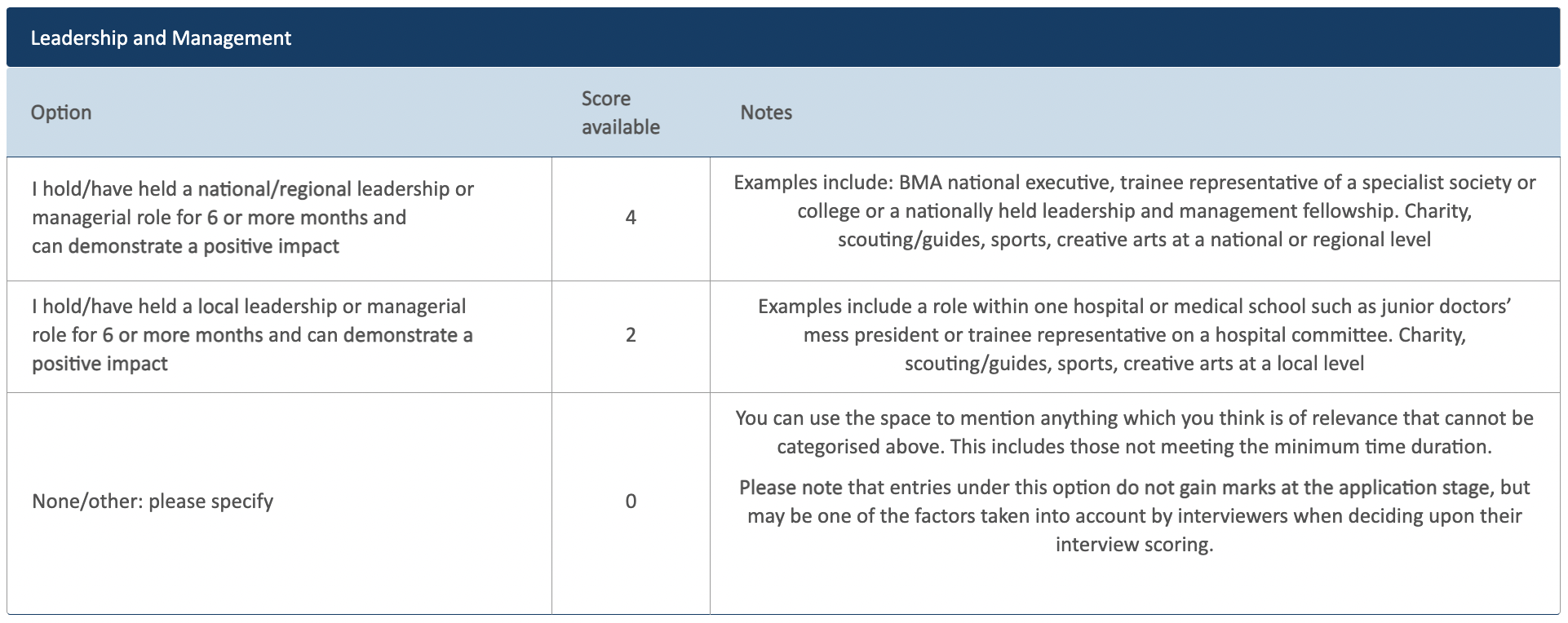
To score points in this role you must be able to indicate how you have made a difference in your leadership/management role; you will be given the opportunity to describe this on your application form.
Timing/duration of role
The point scoring options can only be used for roles which you have held since starting your first undergraduate degree (either your primary medical degree or a prior degree) and for a minimum of six months. The six months is as of the application closing date and no leeway is allowed to ensure consistency for all applicants.
Examples of evidence
Examples could include: minutes from meetings, a headed document, from the organisation in which the role was based, which confirms: your appointment to the role; the requirements of the role; your contribution and how you made an impact, a paper/report you have produced, formal feedback from colleagues.
Your evidence should be able to demonstrate that you held/have held the role for the six-month minimum.
Total Application Score (Max 38 points)
Shortlisting is the only stage at which the self-assessment score will be used; although you will have opportunity at interview to summarise and discuss your achievements, and this will form a significant contribution to the interview score.
There is no contribution to your interview score beyond the shortlisting process.

